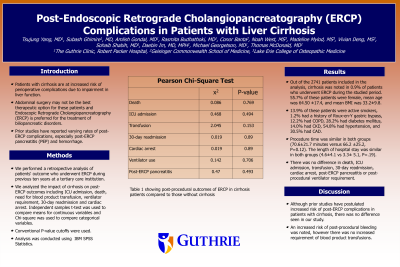Sunday Poster Session
Category: Interventional Endoscopy
P1052 - Post-Endoscopic Retrograde Cholangiopancreatography (ERCP) Complications in Patients with Liver Cirrhosis
Sunday, October 27, 2024
3:30 PM - 7:00 PM ET
Location: Exhibit Hall E

Has Audio

Tsujung Yang, MD
Guthrie Robert Packer Hospital
Sayre, PA
Presenting Author(s)
Tsujung Yang, MD1, Subash Ghimire, MD1, Amlish Gondal, MD1, Rasmita Budhathoki, MD1, Conor Banta, 2, Noah West, MS3, Madeline Mylod, MS3, Vivian Deng, MS3, Sohaib Shabih, MD1, Daebin Im, MD, MPH1, Michael Georgetson, MD1, Thomas McDonald, MD1
1Guthrie Robert Packer Hospital, Sayre, PA; 2Geisinger Commonwealth School of Medicine, Sayre, PA; 3Lake Erie College of Osteopathic Medicine, Sayre, PA
Introduction: Patients with cirrhosis are at increased risk of perioperative complications due to impairment in liver function. Abdominal surgery may not be the best therapeutic option for these patients and Endoscopic Retrograde Cholangiopancreatography (ERCP) is preferred for the treatment of biliopancreatic disorders. Prior studies have reported varying rates of post-ERCP complications, especially post-ERCP pancreatitis (PEP) and hemorrhage.
Methods: We performed a retrospective analysis of patients' outcome who underwent ERCP during previous ten years at a tertiary care institution. We analyzed the impact of cirrhosis on post-ERCP outcomes including ICU admission, death, need for blood product transfusion, ventilator requirement, 30-day readmission and cardiac arrest. Independent samples t-test was used to compare means for continuous variables and chi square was used to compare categorical variables. Conventional p value cutoffs were used. Analysis was conducted using Statistical Package for the Social Sciences (SPSS).
Results: Out of the 2741 patients included in the analysis, cirrhosis was noted in 0.9% of patients who underwent ERCP during the studied period. 55.7% of these patients were female, mean age was 64.50 ±17.4, and mean BMI was 33.2±9.8. 13.9% of these patients were active smokers, 1.2% had a history of Roux-en-Y gastric bypass, 12.2% had COPD, 28.2% had diabetes mellitus, 14.0% had CKD, 54.8% had hypertension, and 30.5% had CAD. Procedure time was similar in both groups (70.6±21.7 minutes versus 66.2 ±25.2, P=0.12). The length of hospital stay was similar in both groups (4.6±4.1 vs 3.3± 5.1, P=.19). There was no difference in death, ICU admission, transfusion, 30-day readmission, cardiac arrest, post-ERCP pancreatitis or post-procedural ventilator requirement.
Discussion: Although prior studies have postulated increased risk of post-ERCP complications in patients with cirrhosis, there was no difference seen in our study. An increased risk of post-procedural bleeding was noted, however there was no increased requirement of blood product transfusions.
Note: The table for this abstract can be viewed in the ePoster Gallery section of the ACG 2024 ePoster Site or in The American Journal of Gastroenterology's abstract supplement issue, both of which will be available starting October 27, 2024.
Disclosures:
Tsujung Yang, MD1, Subash Ghimire, MD1, Amlish Gondal, MD1, Rasmita Budhathoki, MD1, Conor Banta, 2, Noah West, MS3, Madeline Mylod, MS3, Vivian Deng, MS3, Sohaib Shabih, MD1, Daebin Im, MD, MPH1, Michael Georgetson, MD1, Thomas McDonald, MD1. P1052 - Post-Endoscopic Retrograde Cholangiopancreatography (ERCP) Complications in Patients with Liver Cirrhosis, ACG 2024 Annual Scientific Meeting Abstracts. Philadelphia, PA: American College of Gastroenterology.
1Guthrie Robert Packer Hospital, Sayre, PA; 2Geisinger Commonwealth School of Medicine, Sayre, PA; 3Lake Erie College of Osteopathic Medicine, Sayre, PA
Introduction: Patients with cirrhosis are at increased risk of perioperative complications due to impairment in liver function. Abdominal surgery may not be the best therapeutic option for these patients and Endoscopic Retrograde Cholangiopancreatography (ERCP) is preferred for the treatment of biliopancreatic disorders. Prior studies have reported varying rates of post-ERCP complications, especially post-ERCP pancreatitis (PEP) and hemorrhage.
Methods: We performed a retrospective analysis of patients' outcome who underwent ERCP during previous ten years at a tertiary care institution. We analyzed the impact of cirrhosis on post-ERCP outcomes including ICU admission, death, need for blood product transfusion, ventilator requirement, 30-day readmission and cardiac arrest. Independent samples t-test was used to compare means for continuous variables and chi square was used to compare categorical variables. Conventional p value cutoffs were used. Analysis was conducted using Statistical Package for the Social Sciences (SPSS).
Results: Out of the 2741 patients included in the analysis, cirrhosis was noted in 0.9% of patients who underwent ERCP during the studied period. 55.7% of these patients were female, mean age was 64.50 ±17.4, and mean BMI was 33.2±9.8. 13.9% of these patients were active smokers, 1.2% had a history of Roux-en-Y gastric bypass, 12.2% had COPD, 28.2% had diabetes mellitus, 14.0% had CKD, 54.8% had hypertension, and 30.5% had CAD. Procedure time was similar in both groups (70.6±21.7 minutes versus 66.2 ±25.2, P=0.12). The length of hospital stay was similar in both groups (4.6±4.1 vs 3.3± 5.1, P=.19). There was no difference in death, ICU admission, transfusion, 30-day readmission, cardiac arrest, post-ERCP pancreatitis or post-procedural ventilator requirement.
Discussion: Although prior studies have postulated increased risk of post-ERCP complications in patients with cirrhosis, there was no difference seen in our study. An increased risk of post-procedural bleeding was noted, however there was no increased requirement of blood product transfusions.
Note: The table for this abstract can be viewed in the ePoster Gallery section of the ACG 2024 ePoster Site or in The American Journal of Gastroenterology's abstract supplement issue, both of which will be available starting October 27, 2024.
Disclosures:
Tsujung Yang indicated no relevant financial relationships.
Subash Ghimire indicated no relevant financial relationships.
Amlish Gondal indicated no relevant financial relationships.
Rasmita Budhathoki indicated no relevant financial relationships.
Conor Banta indicated no relevant financial relationships.
Noah West indicated no relevant financial relationships.
Madeline Mylod indicated no relevant financial relationships.
Vivian Deng indicated no relevant financial relationships.
Sohaib Shabih indicated no relevant financial relationships.
Daebin Im indicated no relevant financial relationships.
Michael Georgetson indicated no relevant financial relationships.
Thomas McDonald indicated no relevant financial relationships.
Tsujung Yang, MD1, Subash Ghimire, MD1, Amlish Gondal, MD1, Rasmita Budhathoki, MD1, Conor Banta, 2, Noah West, MS3, Madeline Mylod, MS3, Vivian Deng, MS3, Sohaib Shabih, MD1, Daebin Im, MD, MPH1, Michael Georgetson, MD1, Thomas McDonald, MD1. P1052 - Post-Endoscopic Retrograde Cholangiopancreatography (ERCP) Complications in Patients with Liver Cirrhosis, ACG 2024 Annual Scientific Meeting Abstracts. Philadelphia, PA: American College of Gastroenterology.
